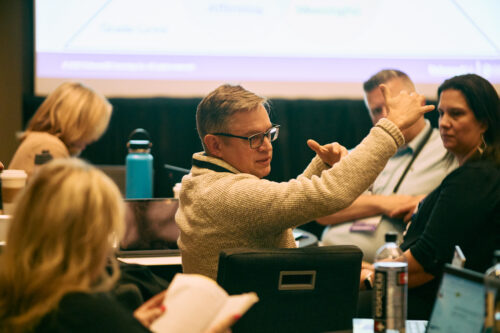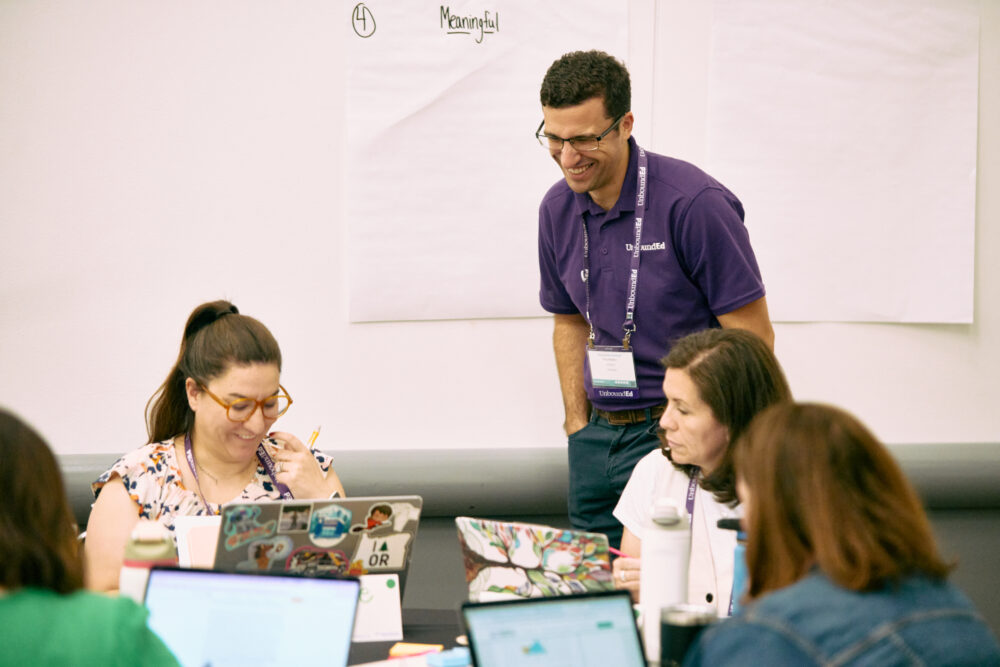Create the conditions for equitable instruction to finally meet the needs of all students.
We all feel the weight of leadership growing heavier and heavier. With widening achievement gaps, unfinished instruction, chronic absenteeism, and staff shortages, the path forward isn’t always clear. But through it all, your commitment to each and every student has never wavered — because you’re a leader.
You know success is possible, but progress takes a team and a plan. Leaders must dig deep and address the root causes of their challenges to drive change. During this three-day leadership retreat, you and your team will have the time and space to align on a shared vision and build an actionable plan for addressing systemic barriers and inequities that keep you from meeting the needs of all students.
Through consultancies and professional learning communities, leaders will learn to create the conditions for equitable instruction by aligning the time, talent, and tools within their sphere of control. Participants will clarify their leadership role, receive hands-on support with their problem of practice, and learn to drive progress through continuous improvement. By planning and learning together, teams will grow their collective impact and leave ready to lead for grade-level, engaging, affirming, and meaningful — GLEAM™ — instruction.
What to Expect at the Leadership Institute
At Leadership Institute, leaders and teams will have the time and space to:
- Examine the barriers and inequities affecting your school system and develop an action plan to address them.
- Focus on a problem of practice aligned with the team’s vision for impact.
- Evaluate leadership approaches and their impact on urgent problems of practice.
- Learn how to utilize time, money, and people more effectively for improved outcomes.
Leaders and teams will leave Leadership Institute with:
- An action plan and a vision for grounding your work and classrooms in equitable instruction.
- The skills necessary to lead, support, and sustain equitable instruction across every classroom.
- A national community of justice-seeking leaders committed to every student’s success.
- A partner equipped to help you see your plan through, no matter what’s next.
Our commitment to you doesn’t end after three days. UnboundEd and our subsidiary, CORE Learning, are uniquely equipped to help you see your plan through. We work side-by-side with teachers, coaches, principals, and district leaders to cultivate the mindsets, knowledge, and skills at the heart of truly transformative teaching and learning.

Begin your GLEAM Leadership Journey Today
Connect with Our TeamHow We Organize the Learning
-
District Leaders Pathway
State and district leaders explore their leadership identity and how it impacts educational equity. They apply an “equity lens,” examining their power to reshape policies and the systems they lead. Through UnboundeEd’s approach, they learn how to create conditions that foster grade-level, engaging, affirming, and meaningful — GLEAM™ — instruction across districts and schools.
State and district leaders then:
- Identify barriers to advancing equitable policies and instructional models across schools.
- Collaborate with role-alike peers to develop strategies for overcoming time, staffing, and budgeting challenges.
- Leave with tools, protocols, and an action plan for leading and scaling GLEAM instructional practices.
-
Principals and Assistant Principals Pathway
Principals and assistant principals explore how their roles impact educational equity in their schools. They apply an “equity lens,” examining their power to reshape policies and practices within their schools. Through UnboundEd’s approach, they identify and strategize around barriers to operationalizing and implementing grade-level, engaging, affirming, and meaningful — GLEAM™ — instruction within a school system.
Principals and assistant principals then:
- Identify barriers to advancing equitable practices in their schools and ensure collective leadership.
- Collaborate with role-alike peers to develop strategies for implementing GLEAM instruction, focusing on optimizing time, teams, and budgets.
- Leave with tools, protocols, and an action plan for leading and scaling GLEAM instructional practices.
-
School-Based Leaders Pathway
School-based leaders, including coaches, grade, team, or department leads, and operations directors, explore how their practices influence student outcomes and contribute to educational equity in their schools. They apply an “equity lens,” examining their influence on policy creation and implementation within their schools. Through UnboundEd’s approach, they strengthen their ability to foster collective efficacy on their teams and implement instructional practices that advance grade-level, engaging, affirming, and meaningful — GLEAM™ — instruction.
School-based leaders then:
- Identify barriers to advancing equitable instructional practices in their schools and classrooms.
- Collaborate with role-alike peers to develop strategies for improving instructional practices by optimizing time, teacher teams, and resources.
- Leave with tools, resources, and an action plan for building team efficacy and implementing GLEAM instruction.
-
CORE Learning: Leadership for Literacy
The Leadership for Literacy pathway provides participants with transformative instructional practices to develop a foundational understanding of the Science of Reading and create a literacy system to accelerate student literacy. Through CORE’s Leadership for Literacy course, educational leaders will:
- Develop a foundational working knowledge of the Science of Reading and how it can be implemented in a system through transformative instructional leadership
- Utilize tools and processes to evaluate schoolwide literacy programs
- Identify leadership actions that build schoolwide professional capacity to remove barriers and increase opportunities for students to become successful readers and communicators
This pathway is for leaders who serve K–5 students.

I was surprised at how relevant and practical this experience was. It challenged your thinking and leadership skills in order for you to reflect and adjust to better meet the needs of all stakeholders.
PrincipalRegister for Leadership Institute 2025


Register for Leadership Institute 2025
Support for Registered Attendees
If you are registered for the Leadership Institute and have questions related to things like attendance, billing, technical assistance, or accommodation, please contact SupportDesk@UnboundEd.org for support.

